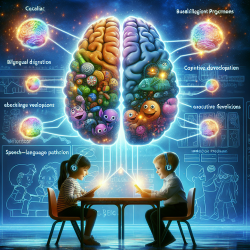Recent research published in Frontiers in Psychology titled Exploration of Attentional and Executive Abilities in French-Speaking Children Immersed in Dutch Since 1, 2, 3, and 6 Years provides valuable insights into the cognitive benefits of bilingual education. This study specifically explores how the length of time spent in a second-language immersion program impacts attentional and executive functions in children.
The study compared 196 French-speaking children immersed in Dutch since they were five years old with 195 non-immersed peers. The researchers used a range of tasks to assess attentional and executive functions, including cognitive flexibility and working memory. Key findings include:
- After 1, 2, and 3 years of immersion, no significant differences were observed between the immersed and non-immersed children.
- After 6 years, immersed children outperformed their non-immersed peers in cognitive flexibility and working memory tasks.
These results suggest that the cognitive advantages of bilingual education may depend on the duration of immersion. The findings also indicate that the type of second language learned can influence the emergence of cognitive benefits. For instance, while some studies have shown early cognitive advantages in English immersion programs, the benefits in Dutch immersion appear later, around the sixth year of schooling.
For practitioners, these insights emphasize the importance of sustained immersion in achieving cognitive benefits. Here are some practical steps to implement these findings:
- Encourage Long-Term Immersion: Advocate for immersion programs that extend beyond the initial years of schooling to maximize cognitive benefits.
- Monitor Cognitive Development: Regularly assess attentional and executive functions to track progress and adjust educational strategies accordingly.
- Consider Language Characteristics: Be mindful of the specific linguistic challenges posed by different second languages and tailor instructional approaches to address these challenges.
Moreover, the study underscores the need for further research to explore the variability in cognitive outcomes across different languages and educational contexts. By understanding these nuances, educators and speech-language pathologists can better support bilingual learners.
To read the original research paper, please follow this link: Exploration of Attentional and Executive Abilities in French-Speaking Children Immersed in Dutch Since 1, 2, 3, and 6 Years.










